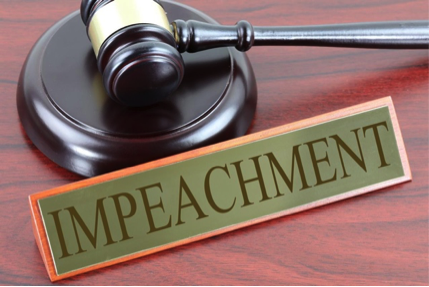
By Tia Humphries
House Speaker Nancy Pelosi has announced an impeachment inquiry against President Donald Trump, but what does that mean and how does the impeachment process work?
The impeachment process is a protected right in the Constitution that is essential to holding the U.S. government accountable.
As part of the government’s checks and balances, Congress has the power to remove any civil officer of the government, including the president, during their term if the officer has committed a crime while in office. The most recent inquiry, launched Sept. 24, comes as a result of Trump asking Ukraine to investigate his political opponent, former Vice President Joe Biden.
The Constitution states that the House of Representatives has the power to impeach, or bring charges, and the Senate conducts the trial. An allegation of a crime of treason, bribery or an abuse of power is required to launch an impeachment inquiry. Once the House files an inquiry, the House Judiciary Committee will conduct an investigation of the president’s actions that are in question. The committee will then present the data they collect to the entire House for a vote. A simple majority vote is needed for indictment on the charges.
The articles of impeachment then move to the Senate for a trial supervised by the chief justice of the United States. Both sides are given an opportunity to call witnesses and cross examine each other. The Senate needs a supermajority vote of two-thirds in order to convict the president. Despite being under investigation, the president remains in office during the trial. The Senate’s vote determines whether the president will be convicted or acquitted on all charges. The Constitution states that the Senate’s decision is final and cannot be appealed in any court of law.
If found guilty, the president is removed from office. The Senate may then vote to restrict the president from running for or being appointed to future office. Since the Senate trial is not a criminal proceeding, the president could be subjected to a criminal prosecution following impeachment.
Before President Trump, only three presidents had experienced an impeachment inquiry. The most recent was President Bill Clinton in 1998.
One factor that affects the outcome of the impeachment process is who controls Congress. If the same party does not control the House and the Senate, it may be challenging to reach a conviction. For example, the House impeached Presidents Andrew Johnson and Clinton, but both were acquitted by the Senate.
In the case against Trump, who is a Republican, the Democrats control the House and the Republicans dominate the Senate. Alternatively, Trump’s impeachment inquiry could resemble President Nixon’s experience. Nixon resigned before having a trial because he was certain he would be removed from office by Congress after the Watergate scandal.


